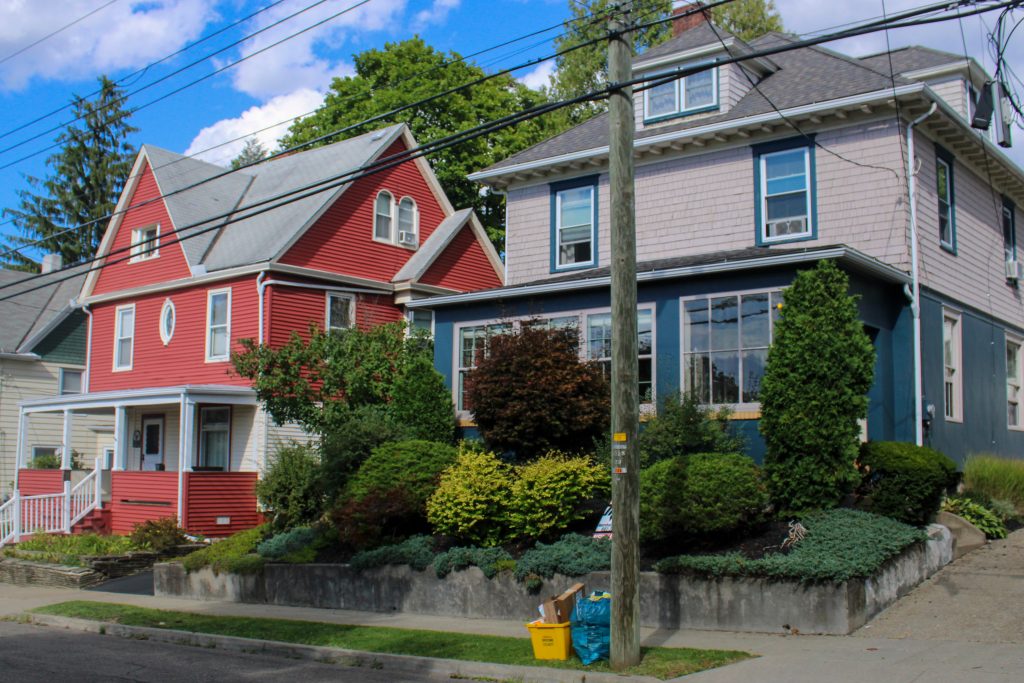Binghamton Mayor Jared Kraham’s legislation to restrict student housing in residential areas will go before the Planning Commission on Monday, Sept. 12.
First proposed in July, the law would prohibit four or more college students from living in areas of Binghamton deemed single-family and two-family residential zones, known as R1 and R2, respectively — which include large parts of the West Side. Unless student housing is either in a commercial zone or multi-unit residential areas, also known as an R3 zone, the units will be subject to prosecution by July 1, 2023.
The Binghamton Planning Commission will review the legislation before it is sent to Binghamton City Council. Constituents will be able to attend a virtual public hearing to voice their opinions to the Planning Commission, with the Zoom link found on the Binghamton City calendar.
Juliet Berling, director of planning, housing and community development (PHCD), said the Planning Commission will factor public comments into their decision letter to Binghamton City Council. In addition to the virtual hearing, the Binghamton City Council will also hold a public hearing prior to issuing the final vote on this legislation, according to the Department of Planning, Housing and Community Development, though the date has yet to be announced.
According to Berling, the Planning Commission has a “good approximation” of where the majority of students currently reside, and they believe the new zoning law will not change where many students live. Berling said that safer student housing is among the main concerns for the commission.
“One reason we’re doing this is to require everyone to have a code review,” Berling said. “We want to make sure the buildings students are living in have been [reformed] correctly and are safe.”
Many R1, R2 and R3 zone uses will require review, needing an approval by the Planning Commission, according to a Student Housing Legislation Summary of Changes, provided by Anindya Debnath, the Student Association vice president for student success.
JP Dillon, a senior at Binghamton University double-majoring in environmental studies and biology, questioned how the legislation would be effectively enforced. Dillon owns the Instagram page, @ny.victorian, a photography page that features Victorian houses and their history across New York state.
“The city has had issues with its current code displacing residents if enforced, which sometimes leads to situations in which the landlord is not fixing an apartment and tenants aren’t moving out because there is simply nowhere to go,” Dillon wrote. “Essentially what I’m saying is, their current method of code enforcement is problematic, so I don’t see how this new code-enforced legislation could be anything beneficial. I have knowledge that all these apartments within the new development zone will have to undergo inspection, but I want to raise questions as to timelines and protocol for that. Especially if students are inhabiting those units at the times that code enforcement is inspecting.”
Some students also expressed concern that these potential changes will make affording BU more difficult for students from lower socioeconomic backgrounds. Aviva Friedman, a Binghamton City Council member, explained that she is taking into consideration this point of view, with her goal being to promote safe student housing.
“I always approach this by trying to incentivize rather than punish,” Friedman wrote in an email. “If we look at this legislation and what issue it’s attempting to address, in my mind it’s an attempt to address predatory renting practices by landlords, or not landlords, but student housing developers that will often buy up properties and then rent them out to students. Will this fix this problem? That remains to be seen, but I never want something I vote for to be punitive.”
When Mayor Kraham first announced the legislation, he said the goal was to preserve the “integrity of single-family residential neighborhoods” while also increasing the non-student market, so that Binghamton families “living paycheck to paycheck” are not competing with college students.
Dillon said he is doubtful this legislation will be effective in these goals.
“This plan does nothing to create more city-owned [Binghamton Housing Authority] units, of which there is already a deficit, and it does nothing to encourage or provide funding to either developers or to organizations like the Southern Door CLT for developing more housing for the low-income, disabled or those who receive benefits from government organizations,” Dillion said. “I believe they should highly consider enforcement and branding of this legislation. If they would like it to help those living paycheck to paycheck, the absolute best thing they can do is to provide housing for them.”
In Kraham’s press release, he stressed the importance of balance between housing for long-term families and students.
“Students are a vital part of Binghamton’s culture and economy, but an absence of student housing regulations have created neighborhood problems that negatively impact students and families alike,” Kraham said.



